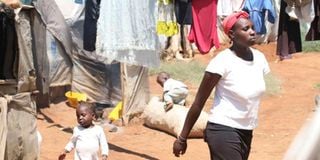Let next President pursue treaty on gender violence

Internally displaced persons at Naka camp at Yamumbi in Uasin Gishu County in this 2011.
What you need to know:
- In the run-up to the 2017 General Election, female political aspirants faced harassment, intimidation and abuse.
- In March last year, WHO took the unusual but necessary step describing violence against women as “devastatingly pervasive”.
As the election season heats up, the deep-seated and ever-present apprehension related to violence against women and girls has once again reared its ugly head. Every election year, female candidates are sexually, physically or verbally assaulted. Officials said at least 900 cases of sexual violence occurred following the disputed 2007 General Election with women targeted on the basis of ethnicity.
In the run-up to the 2017 General Election, female political aspirants faced harassment, intimidation and abuse. Millie Odhiambo’s house was burnt down and her bodyguard killed; Eunice Wambui was physically assaulted; and Esther Passaris was held hostage at a university by male students. Sadly, the normalisation of gender violence in Kenya seems to advance, reaching deplorable levels.
In a report released on January 18, the International Federation for Human Rights and the Kenya Human Rights Commission warned that, unless the government took urgent concrete measures, the sexual and gender-based violence will likely be repeated before, during and after the 9 August elections.
Kenya’s situation reflects global trends. In March last year, WHO took the unusual but necessary step describing violence against women as “devastatingly pervasive”. One in three women is subjected to physical or sexual violence by an intimate partner or even non-partner. The cost of that is 5.5 per cent of the global economy, making it an economic and social disaster. Clearly, the international framework does not meet women’s and girls’ needs. And herein lies the opportunity for the next Kenyan president.
Proven interventions
Every Woman, a global coalition of more than 1,700 women’s rights advocates in 128 countries that I am a part of, is working with activists, civil society organisations and UN member states to secure a treaty specific to eliminating violence against women and girls. It is drawing attention to the fact that there is no specific legally binding instrument on violence against women at the global level.
Despite the regional mechanisms, 75 per cent of women, primarily black and brown, lack access to such a treaty. Monitoring mechanisms do not adequately hold countries accountable for ending this violence and suffer from lack of resources and inefficient systems, contributing to impunity. The new treaty would mandate that governments implement a package of proven interventions, which will be monitored by a clear, metrics-based scorecard.
In his address to the UN General Assembly last September, Nigeria’s President Muhammadu Buhari called for collective global action through a treaty. This was echoed two months later by the then-African Union chairperson, DR Congo President Félix Tshisekedi. The Organization of American States Secretary General Luis Almagro and Colombia’s President Iván Duque Márquez also did.
Kenya plays an active facilitation role within the UN and is viewed as a regional leader. By including its voice in the call, the next President has the opportunity to lead the change to end the violence.
Ms Ng’inja-Croft, a lawyer, is a consultant with the United Nations. [email protected]





